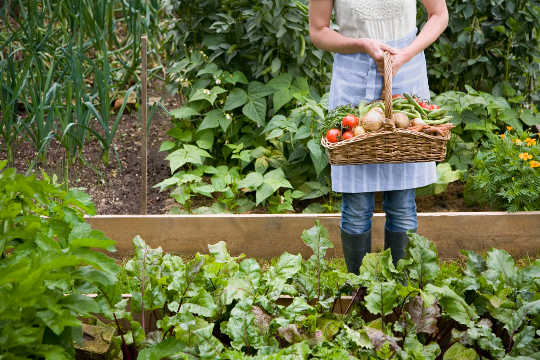
"There seems to be evidence of more home cooking, gardening, and reliance on shelf-stable foods, as well as increased dependence on local farmers and community-supported agriculture producers, though it's too early to discern if these shifts will translate to changing habits," says Brianne Donaldson.
The pandemic may raise widespread awareness of the production, processing, and distribution of food to new heights.
Restaurant and meat plant closures due to the coronavirus crisis are forcing farmers to dispose of their products—from killing livestock to dumping milk and plowing under produce—while shoppers are facing empty grocery store shelves.
Here, Brianne Donaldson, assistant professor of philosophy and religious studies and chair in Jain studies at the University of California, Irvine, discusses how these disruptions in the supply chain have prompted shifts in our eating habits. Donaldson’s research examines assumptions in scientific, secular and religious worldviews that marginalize plants, animals and certain people—and often justify violence.
Get The Latest By Email
She also explains how, for many, the pandemic has led to serious contemplation of the deep connections among the US food system, farmers, consumers, health, and climate change:
Q
What is happening to the US food system in the wake of the pandemic?
A
There have been two major consequences: dumping produce and milk due to a massive reduction in restaurant demand coupled with the inability to redirect restaurant-packaged food for in-home use; and the culling of animals due to slaughterhouse slowdowns and closures as a result of workers testing positive for COVID-19, as well as a decline in restaurant orders. This means that animals raised to be killed for meat at a young age and specific weight have to be killed by other means, including lethal injection, shotgun, abortion, and incineration. Slaughterhouse closures have led to meat shortages and rationing.
Q
How are these changes affecting society, the climate, and personal health?
A
First we need a clearer view of the existing food system. Current US dependence on cheap, animal-based meat, milk, and eggs hinges on federal subsidies for monocrop grains such as corn and soy—the vast majority of which are inefficiently used to feed animals rather than people. This makes meat and other animal products falsely cheap relative to other produce and leads to myriad negative consequences. In society, there is increasing awareness of these costs and the volatility of an animal-based food supply chain. Consumers are seeing how meat production is more akin to manufacturing cars on an assembly line than an idealized vision of a farmer in overalls with a barn.
The food system exacts one of the heaviest climate costs, in addition to being a serious moral issue concerning sentient beings and workers’ rights. It also has detrimental impacts on public health in terms of diet-related chronic disease and as the source of multiple pandemics, including swine flu, bird flu, salmonella, and E. coli. The continual use of massive amounts of antibiotics on farmed animals has contributed to widespread antibiotic resistance. Slaughterhouse closures have led some people to stock up on meat and others to panic-buy live chicks for an at-home egg supply or seeds to plant gardens. We can say that the short-term environmental footprint—in terms of water use, CO2 emissions, waste processing—of meatpacking has certainly diminished for the present, though long-term shifts are unclear.
In regard to personal health, some citizens have faced food insecurity related to the disruption of school meal programs and job and income losses that impact food purchasing. It’s uncertain what reductions in meat production could mean for physical or social health at this stage in the pandemic.
Q
Are people eating differently during this health crisis?
A
Prior to the pandemic, there was an upward trend in the consumption of plant-based meat products, and data suggests that numerous plant-based companies are experiencing accelerated growth to meet higher demand since the onset of COVID-19 in the US, Europe, and mainland China. There seems to be evidence of more home cooking, gardening, and reliance on shelf-stable foods, as well as increased dependence on local farmers and community-supported agriculture producers, though it’s too early to discern if these shifts will translate to changing habits.
Q
Will there be any lasting trends in eating habits?
A
One can hope that lifting the veil on industrial meat production and its vulnerability to animal-borne pathogens when animals are kept in massive numbers in unhygienic and unsafe confined spaces will boost demand for a more stable, non-animal-based food supply chain globally, as well as compassion for our animal kin and slaughterhouse workers. Substituting plant-based alternatives for animal-based meat, milk, and eggs is likely to continue as that predates COVID-19 and has only accelerated during the pandemic. All of the largest US meat producers—Tyson, Smithfield, Cargill, and JBS—have launched their own plant-based meat alternative lines. It’s too early to tell if other habits related to home cooking, gardening, supporting local growers, or buying will last, although several organizations in the US and Europe are conducting surveys to gather this data.
Q
What will the US food system look like when we’re past the pandemic?
A
It depends on how US consumers and policymakers respond to the weaknesses exposed by COVID-19. This pandemic has raised consumers’ awareness of some of the issues discussed above and seems to be hastening a trend away from animal-based meat, milk, and eggs, which is set to continue as institutions and individuals seek a more secure, healthy, and humane food supply.
Source: UC Irvine
books_food








